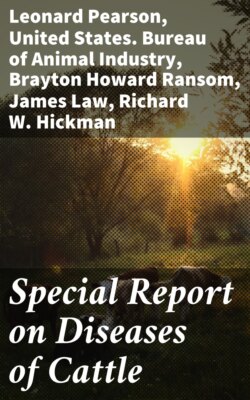Читать книгу Special Report on Diseases of Cattle - Lowe - Страница 42
На сайте Литреса книга снята с продажи.
ENTERITIS (OBSTRUCTION RESULTING FROM INVAGINATION, OR INTUSSUSCEPTION, TWISTING, AND KNOTTING OF THE BOWELS).
ОглавлениеInflammation may arise from a knot forming on some part of the small intestine from the portion of the bowel becoming twisted on itself, or from one part of the bowel slipping into another, which is termed invagination. This form of enteritis occurs occasionally in animals of the bovine species.
Causes.—The small intestine, which in the ox rests on the right side of the rumen, is, from the position which it occupies, predisposed to this accident. It has been ascertained that animals which have shown symptoms of this malady have trotted, galloped, or made other violent exertions in coming from drinking, or that they have been chased by dogs or by animals of their own species while at pasture. The accident is most likely to occur among cattle on very hilly pastures. The danger of jumping or running is greatest when the rumen is distended with food.
Symptoms.—This form of enteritis or obstruction is manifested by severe colicky pains; the ox scrapes and strikes the ground with his front and hind feet alternately; keeps lying down and getting up again; he keeps his tail constantly raised and turns his nose frequently to his right flank; he is frequently bloated, or tympanitic, on that side. He refuses feed and does not ruminate, and for some hours suffers severe pains. At first he frequently passes thin dung, and also urinates frequently, but passes only a little urine at a time. On the second day the pains have become less acute; the animal remains lying down; moans occasionally; his pulse is small and quick; he still refuses feed and does not ruminate. At this stage he does not pass any dung, though sometimes a small quantity of bloody mucus may be passed. The animal passes very little urine. This condition may continue for a considerable time, as cattle so affected may live for 15 or even 20 days.
Post-mortem appearance.—At death the bowels are found to be misplaced or obstructed, as mentioned above, and inflamed, the inflammation always originating at the point where the intestine has been invaginated, twisted, or knotted. Sometimes the part is gangrenous, the compression of the blood vessels preventing circulation, and thus causing the death of the tissues.
Treatment.—Purgatives, anodynes, and other remedies are of no service in such cases, and bleeding also fails to produce any benefit. Indeed, it is usually true that in such cases treatment is useless. Some cases are recorded in which an incision has been made in the flank, so as to enable the operator to restore the intestine to its normal position or to remove the kink.
